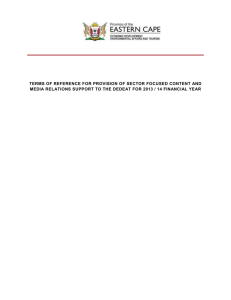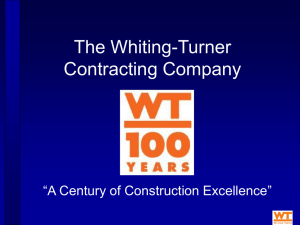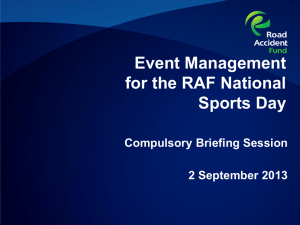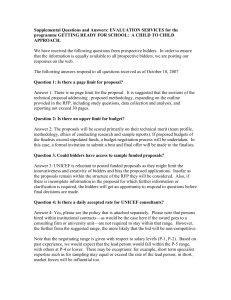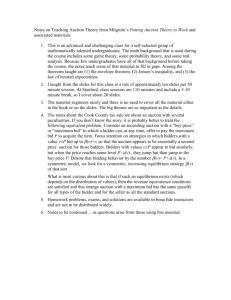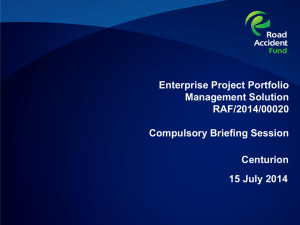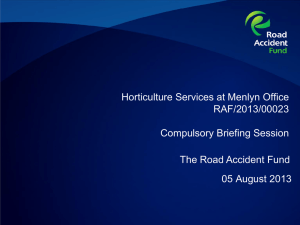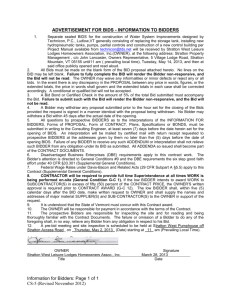Construction Law Bulletin
advertisement
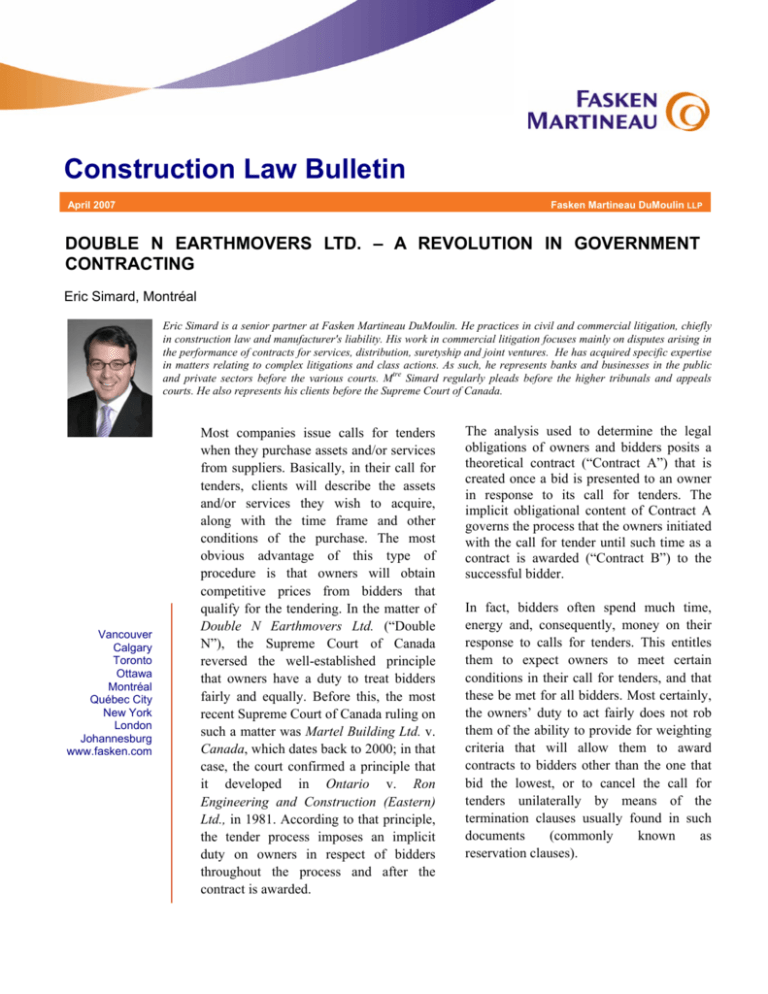
Construction Law Bulletin April 2007 Fasken Martineau DuMoulin LLP DOUBLE N EARTHMOVERS LTD. – A REVOLUTION IN GOVERNMENT CONTRACTING Eric Simard, Montréal Eric Simard is a senior partner at Fasken Martineau DuMoulin. He practices in civil and commercial litigation, chiefly in construction law and manufacturer's liability. His work in commercial litigation focuses mainly on disputes arising in the performance of contracts for services, distribution, suretyship and joint ventures. He has acquired specific expertise in matters relating to complex litigations and class actions. As such, he represents banks and businesses in the public and private sectors before the various courts. Mtre Simard regularly pleads before the higher tribunals and appeals courts. He also represents his clients before the Supreme Court of Canada. Vancouver Calgary Toronto Ottawa Montréal Québec City New York London Johannesburg www.fasken.com Most companies issue calls for tenders when they purchase assets and/or services from suppliers. Basically, in their call for tenders, clients will describe the assets and/or services they wish to acquire, along with the time frame and other conditions of the purchase. The most obvious advantage of this type of procedure is that owners will obtain competitive prices from bidders that qualify for the tendering. In the matter of Double N Earthmovers Ltd. (“Double N”), the Supreme Court of Canada reversed the well-established principle that owners have a duty to treat bidders fairly and equally. Before this, the most recent Supreme Court of Canada ruling on such a matter was Martel Building Ltd. v. Canada, which dates back to 2000; in that case, the court confirmed a principle that it developed in Ontario v. Ron Engineering and Construction (Eastern) Ltd., in 1981. According to that principle, the tender process imposes an implicit duty on owners in respect of bidders throughout the process and after the contract is awarded. The analysis used to determine the legal obligations of owners and bidders posits a theoretical contract (“Contract A”) that is created once a bid is presented to an owner in response to its call for tenders. The implicit obligational content of Contract A governs the process that the owners initiated with the call for tender until such time as a contract is awarded (“Contract B”) to the successful bidder. In fact, bidders often spend much time, energy and, consequently, money on their response to calls for tenders. This entitles them to expect owners to meet certain conditions in their call for tenders, and that these be met for all bidders. Most certainly, the owners’ duty to act fairly does not rob them of the ability to provide for weighting criteria that will allow them to award contracts to bidders other than the one that bid the lowest, or to cancel the call for tenders unilaterally by means of the termination clauses usually found in such documents (commonly known as reservation clauses). Fasken Martineau DuMoulin LLP CONSTRUCTION LAW (CONT’D) Past case law unanimously acknowledged that owners had the obligation to award contracts only to bidders that filed compliant bids. Any breach of this rule, in other words any contract awarded to a non-compliant bidder, violated the implicit obligation created by Contract A in favour of the other compliant bidders. This was the duty to act fairly. owner undertakes a fair evaluation and enters into Contract B on the terms set out in the tender documents, Contract A is fully performed. Thus, any obligations on the part of the owner to unsuccessful bidders have been fully discharged. Contract B is a distinct contract to which the unsuccessful bidders are not privy. In Ron Engineering, Estey J. held that the “integrity of the bidding system must be protected where under the law of contracts it is possible to do so” (p. 121 (emphasis added)). The law of contract does not permit Double N to require the cancellation of a contract to which it is not privy in the name of preserving the integrity of a bidding process, which is by definition completed by the time an award of Contract B is made. In Double N, the City of Edmonton (the “City”) issued a call for tenders in 1986 to award a contract to supply equipment and operators for a 30-month term. The bid documents provided that all machinery used had to be models no older than 1980. Double N and Sureway Construction of Alberta Ltd. (“Sureway”) presented bids in response to the City’s call for tenders. Double N apparently suspected that Sureway’s vehicles did not meet the specifications of the call for tenders as it had claimed in its bid, and informed the City. The City, however, disregarded the information and did not check Sureway’s ability to provide the vehicles demanded in the call for tenders. In the end, Sureway was awarded the contract seeing as it was the lowest bidder. After Sureway was awarded the contract, it informed the City that some of the equipment it would be using to perform the contract was manufactured before 1980. As this was not in its view an essential condition of the call for tenders, the City disregarded the requirement, continued to consider Sureway a compliant bidder and awarded the contract. Double N sued the City on the grounds that the latter had violated its implicit duty under Contract A to treat bidders fairly and that it had accepted a bid that did not meet the requirements set out in the call for tenders, namely to provide the City with equipment manufactured no earlier than 1980. At the time, Double N’s suit stood a good chance of succeeding, given the state of law. In a split decision (5 against 4), the Supreme Court of Canada concluded that the owner’s duty to treat bidders fairly was limited to the period beginning with the call for tenders and ending with the awarding of the contract to the successful, compliant bidder (“Contract A”). The owner’s duty to treat bidders fairly does not extend to the post-award period (“Contract B”). Justices Abella and Rothstein, for the majority, explain this in the following terms in paragraph 71: The conduct Double N complains of (i.e. the waiver by the City of the 1980 requirement) is conduct which occurred after the award of Contract B. Where an P. 2 The four dissenting judges of the Supreme Court of Canada concluded that the machinery’s date of manufacture was an essential condition of the City of Edmonton’s call for tenders. When informed of Sureway’s failure to meet this condition, after the initial evaluation of the lowest bid, the City had the duty, under Contract A, to reject Sureway’s non-compliant bid. Justice Charron explained, moreover, how the majority’s approach is at odds with the duty to treat bidders fairly (par. 123): The right to insist on compliance cannot turn what is on its face a non-compliant bid into a compliant one. Furthermore, I fail to see how the integrity of the bidding process is protected by allowing a bidder to get rid of the competition unfairly and then hash it out with the owner after it has been awarded the contract. Approaching the tendering process in this manner encourages precisely the sort of duplicity seen in the present appeal. A bidder can submit a bid that is either ambiguous or deliberately misleading but compliant on its face in some respects, secure in the knowledge that if it is awarded Contract B it will be in a strong position to renegotiate essential terms of the contract. And an owner can reason that it may be best not to resolve any ambiguity before awarding Contract B, since at that time all Contract A obligations towards other bidders will terminate and it can then enter into renegotiations with the successful bidder without fear of liability. This approach is not consistent with a fair and open process. (emphasis added) Fasken Martineau DuMoulin LLP CONSTRUCTION LAW (CONT’D) CONCLUSION were treated unfairly. This is the very essence of the judgment issued by the majority in Double N. The judges clearly recognized that if owners believe that it is in their interest to strike a condition that is not essential to the contract, they have the contractual right to do so, unless stipulated otherwise. Consequently, it is all the more important that calls for tenders be drafted with this judgment in mind. Owners might in future negotiate, even haggle, with the selected bidder by arguing that any condition not met could be considered essential. This means that owners just might in the end obtain prices even lower that those presented in the bid. Double N is a major revolution in government procurement law. First, competitors who are convinced that the information provided by another bidder is false or inaccurate will not incur the owners’ liability if they take the trouble of denouncing the situation under Contract A. The majority very clearly stipulated that owners are not required to conduct an exhaustive investigation into the reliability of the representations that bidders make in their bid. As long as the owners are not convinced that the information is incorrect or constitutes misrepresentation, they are free to deem the bid compliant and award the contract to the lowest bidder. Even if the owners were to learn during their analysis and examination of the lowest bid that it contained inaccuracies, they may still enter into Contract B with the bidder by amending the conditions of the call for tenders. Compliant bidders who, in such cases, are not awarded a contract cannot seek remedy before the courts against the owner by alleging that they P. 3 From the owners’ perspective, this decision is certainly a welcome one. They now have far more room to manoeuvre in the bid process. Eric Simard 514 397 5147 esimard@mtl.fasken.com The texts included in this collection are intended to provide general comments on Construction Law. They reflect the point of view of their respective author and are not opinions expressed on behalf of Fasken Martineau DuMoulin LLP or other member corporations. These texts are not intended to provide legal advice. Therefore, readers should seek out advice on issues specific to them before acting on any information set out in these texts. We would be pleased to provide additional information on request. © 2007 Fasken Martineau DuMoulin LLP Vancouver Calgary Toronto Ottawa Montréal 604 631 3131 info@van.fasken.com 403 261 5350 info@cgy.fasken.com 416 366 8381 info@tor.fasken.com 613 236 3882 info@ott.fasken 514 397 7400 info@mtl.fasken.com Québec New York Londres Johannesburg 418 640 2000 info@qc.fasken.com 212 935 3203 info@nyc.fasken.com 44 20 7917 8500 info@fasken.co.uk 27 11 685 0800 info@jnb.fasken.com
